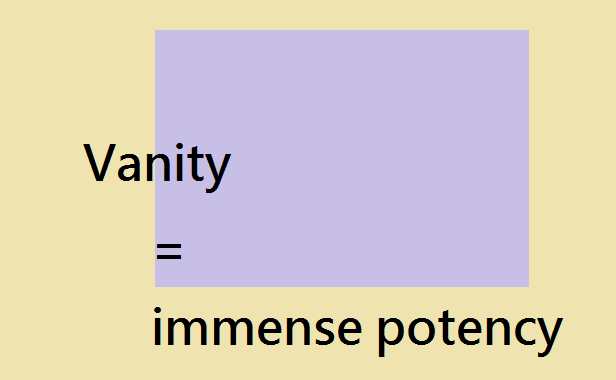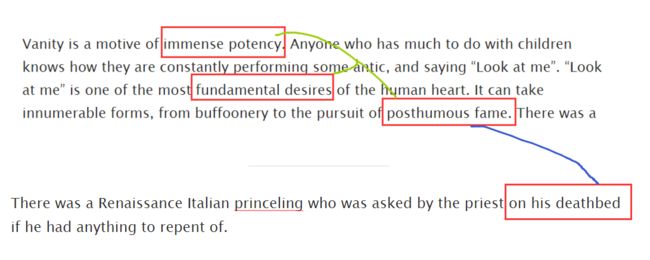夏鵬老师 | 20151127
今天講得是
一個羅素的心理學的一個東西。
--
What Desires Are Politically Important?
Bertrand Russell
Nobel Lecture
December 11, 1950
(short excerpt)
Vanity is a motive of immense potency. Anyone who has much to do with children knows how they are constantly performing some antic, and saying “Look at me”. “Look at me” is one of the most fundamental desires of the human heart. It can take innumerable forms, from buffoonery to the pursuit of posthumous fame. There was a Renaissance Italian princeling who was asked by the priest on his deathbed if he had anything to repent of. “Yes”, he said, “there is one thing. On one occasion I had a visit from the Emperor and the Pope simultaneously. I took them to the top of my tower to see the view, and I neglected the opportunity to throw them both down, which would have given me immortal fame”. History does not relate whether the priest gave him absolution.
- 個體存在與個體自由之間的關係。
Vanity
| 虛榮的,虛華的,無價值的
他說,
首先,
這種虛無呀,
這種名利呀,
a motive of
immense potency
他,
實際是一個動機,動因 | motive
of immense potency
immense | 巨大的
potency = power | 能量,力量
所以呢,
其實,
of immense potency,這個詞,
of 作為一個結構,是吧。
表示,
是這個,
名詞具備著一種形容詞性。
那麼,
of immense potency
就等於
very powerful
of immense potency
=
very powerful
Vanity is a very powerful motive.
Vanity
is
a motive of
immense potency.
Vanity is a motive of immense potency.
Vanity = immense potency
總-分-總
三段結構
巨大的動因
名詞具備的一種形容詞性
a motive of immense potency
往下就會講,
為什麼
Vanity is a motive of immense potency.
---
Anyone
who has much to do with children
knows how they are constantly
performing some antic,
and saying “Look at me”.
Anyone
這個字出現,
他的舉的例子,
相對來講是
比較的全面或者是比較普世的,
他才會用Anyone。
從某些意義上來講,
也就是說
講得這個事情
是一定會發生的,
大家都有這個感覺,
才會用這個Anyone。| 任何一個人。
跟 ___
有很多的這個交流
跟 孩子
有很多的交流的任何一個人
who has much to do with children | 定語從句
往下看,叫,
knows how they are
constantly performing some antic,
他們呢,這些跟孩子經常打交道的人都知道,叫,
how they are
they 指的就是 children
這些孩子
they are constantly performing some antic,
constantly | 一直的 | always
performing some antic
perform | 表演
performing antic | 固定搭配 |
antic | 滑稽的動作,古怪的動作
performing antic | 固定搭配 | 譁眾取寵
performing some antic, and saying
performing 跟 saying 做了一個並列。
經常說什麼呢?
叫,___
“Look at me”
他不僅要做一些好玩得,
古怪的這種動作,這些小孩,
他邊做還得邊說 : 快來看看我,看看我。
叫,
“Look at me”
“Look at me”
Anyone who has much to do
with children knows how
they are constantly
performing some antic, and
saying “Look at me”.
那這句話講完之後,
我們就得討論一個問題,
他跟
Vanity is a motive of immense potency.
他們之間有什麼關係?
Vanity,
首先表示的是空虛。
那麼,
這個空虛,
來自於下文當中的哪一個呢?
一個,首先是這個antic。| 很滑稽的事情。
另外一個,最關鍵的,叫,“Look at me”。
( 自己認為自己很重要,
自己希望大家都來看。
這個就是一個,
“Look at me”的心理狀態。)
“Look at me” 對應著前面 Vanity。
“Look at me”
is one of the most fundamental
desires of the human heart.
說,
“Look at me”
這件事情呢,
其實是人類內心當中,
非常基礎的幾個欲望之一。
fundamental | 基礎的
一旦,
我們在談論
什麼事情是基礎的時候,
我們核心想強調的是,
他必不可缺的。
如果我們在做論證的時候,
往往他也會變成
是我們後續論證的一個起點。
“Look at me”
is one of the most fundamental
desires of the human heart.
那,
我們又得再往下看,
他怎麼跟最基本的本能有關係呢?
Vanity
和
fundamental desires,
對應。
也就是人類阿,
他從本能上面來講,
他就是驅使在Vanity上面。
往下,
It can take innumerable forms,
from buffoonery to
the pursuit of posthumous fame.
It 指代 “Look at me”,
就是“Look at me”這件事情,
can take innumerable forms
take forms | 可以化做各種各樣的形狀
innumerable | 形容詞 | 不可估量的,無數的
It can take innumerable forms,就是
“Look at me”
這件事情
他可以有各種各樣的外化的形式。
innumerable | 此處,強調
於此同時呢,這個地方有一個forms,
跟forms很相似的詞,kinds,types,sorts
這些表示分類的詞,
後面可能會是,
列舉出來
從 ... 到 ...
例如 ...
包括 ...
所以,
往後看,from 出來了。
從 A 到 B。
從 A 到 B。
從 什麼呢 ?
buffoonery | 譁眾取寵
( 說話的時候,好玩的,做做怪樣。)
buffoonery
對應
performing antic。
posthumous
| past 在...之後
| 真正的把他埋在泥土之後,表示死後的。
posthumous fame
| 死後獲得的名
所以在這裏,
羅素他進一步地去講,
人類的空虛,
表現出來的兩種形式,
一類是,
buffoonery,
buffoonery
跟
performing antic 是一件事情。
There was a Renaissance Italian
princeling who was asked
by the priest on his deathbed
if he had anything to repent of.
There was a princeling | 曾經有一個王子
有沒有什麼事情要去懺悔,悔改
| anything to repent of
“Yes”, he said, “there is one thing.
On one occasion
I had a visit
from the Emperor
and the Pope simultaneously.
Emperor and the Pope 同時來了。
I took them to the top of my tower
to see the view,
and I neglected the opportunity
to throw them both down,
which would have given me immortal fame”.
我忽略了一個機會,
幹什麼呢?
把這兩個人同時從那個頂上推下去。
這件事情,
會給我不朽的名。| 永垂不朽的。
History does not relate whether the priest gave him absolution.
歷史並未提及,...
* 一個例子+ 笑點 + punch line
Nobel Lecture by Bertrand Russell (short excerpt)(2 minutes)










